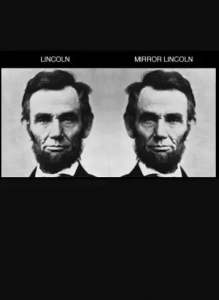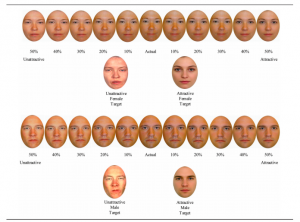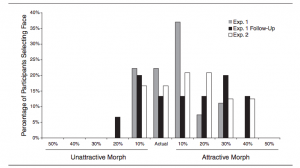The concern about the look in the mirror
“The mirror is not an accurate depiction of what people look like because when people look in the mirror, they will beautify their appearance automatically,” my friend said when I told her I wonder if mirrors are accurate in reflecting how I am supposed to appear. This is a more common situation than not. I found that I look better in a mirror than in photos. Thus, do people prefer their mirror images than real images?

Source: Lincoln images
The Left Pic is real Lincoln
The Right Pic is Lincoln in mirror image
Yes!
Indeed, Mita et al. at the University of Wisconsin Milwaukee found that two-thirds of students preferred their mirror images over their actual photos when they were showed their real and mirror images at the same time.
Which factor can affect people’s preference: self-glorified or familiarity?
Self-glorified
The reason for this preference is not that people “imagine” themselves to be more attractive; If the idea is valid, then either the real image or the mirror image should be self-glorified. Therefore, it cannot explain the difference between real and mirror images.
Familiarity
This preference is derived primarily from the mere exposure effect: familiarity can breed liking. Generally speaking, things that are familiar are likely to be safer than things that are not. If we are familiar with something, we have apparently survived exposure to it, and our brain could recognize this and steer us towards it. Melissa and Fiona found that asking subjects to watch meaningless symbols repeatedly could make them prefer these symbols even if they don’t have any meanings.
The same goes for faces. In our daily lives, we often look ourselves in the mirror, but rarely have the opportunity to see ourselves in the eyes of others. Therefore, we are more familiar with our image in the mirror and enjoy it more. Mita et al. (1977) collected data on friends or romantic partners, and their study found that participants showed the opposite preference that they have more frequently been exposed to their friends’ or romantic partners’ real images than mirror images. Also, that preference was more pronounced among romantic partners because the romantic partners were more likely to contact the subjects.
Podcast from YouTube by skip2mylou:
WHY WE LOOK BETTER IN A MIRROR THAN A PICTURE 2
Do we imagine ourselves to be more attractive than we really are?
Yes!
The key here is that what is the standard of “actual appearance.” If we define the standard of “actual appearance” as the image captured in others’ eyes, then we might imagine ourselves to be more attractive than we really are. The study did by Liu et al. found that people have an incentive to have self-enhancement and want to maintain a positive self-image to others, so they think they are smarter, more ethical, and more attractive than they really are.

Source: Example of averaging procedure
In Nicholas and Erin’s study in 2008, subjects were asked to look at their photographs that had been either enhanced or disfigured to varying degrees and found one picture that was viewed more like themselves. As a result, the study shows that about 55% of subjects chose the slightly enhanced photographs and about 22% of subjects preferred the actual pictures.

Source: Percentage of participants selecting each face as their own image in the averaging procedure:
Also, the level of self-enhancement varies from person to person and is related to emotions, self-esteem and other factors. Specific people, such as people with an eating disorder or body dysmorphic disorder may even think they’re uglier than they really are. The cultural differences also can affect the level of self-enhancement. For example, Asian influenced by cultural norms such as modesty may show the opposite tendency to self-deprecation. In brief, the mirror is not an accurate depiction of what we look like because of self-enhancement, familiarity.
By Zhou Lu
Information attributed from:
- Liu et al. (2011): Pros and Cons of Self-Enhancement: Theory, Empirical Research, and Application
- Melissa Peskin & Fiona N Newell (Feb 1, 2004): Familiarity Breeds Attraction: Effects of Exposure on the Attractiveness of Typical and Distinctive Faces
- Mita et.al (1977): Reversed facial images and the mere-exposure hypothesis.
- Nicholas Epley & Erin Whitchurch (Sep 9, 2008): Mirror, Mirror on the Wall: Enhancement in Self-Recognition
- Raj Raghunathan Ph.D. (Jan 17, 2012): Familiarity Breeds Enjoyment
- Skip2mylou (Sep 15, 2018): WHY WE LOOK BETTER IN A MIRROR THAN A PICTURE 2

